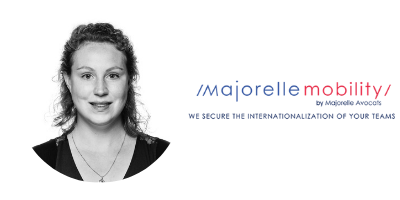- Membership
- The NY Chapter
- Our Career Services
- Committees
- National FACC Network
Meet the Member: Clarisse Delaitre, Employment & Immigration Lawyer
Member news, Women in Business | June 21, 2021
Clarisse joined Majorelle Avocats in 2020 to develop and manage the international mobility (expatriation, secondment) and professional immigration activities of the law firm.
Within the "Majorelle Mobility" department, Clarisse assists French and international companies with all issues related to hiring foreign employees, sending teams abroad, and using foreign subcontractors in France.
Clarisse speaks English and German and also advises foreign companies on the deployment of their activities in France.
Clarisse graduated from Sciences Po Paris in business law and from the University of Paris 1 Panthéon-Sorbonne (Master 2 in labor law). She previously worked for Flichy Grangé Avocats, a leading labor law firm.
FACC: In your role, you help French and international companies with all issues related to hiring foreign employees, sending teams abroad, and using foreign subcontractors in France. Can you tell us what are the most commonly asked questions from these companies that are in need of your services?
When it comes to international mobility and professional immigration, each project is unique.
Several key factors have to be taken into account in order to prepare a professional mobility such as the duration of the planned mobility, the profile of the employee/candidate, his/her nationality, his/her family situation (does the spouse accompany him/her abroad?), or the contractual framework chosen (expatriation, secondment, French or foreign definitive or indefinite employment contract, etc.).
The main questions that should be asked before the project begins are: how to secure the hiring of an American employee in France or the sending of a French employee in the USA? How long do the legal and administrative formalities prior to mobility take? How can the candidate/foreigner obtain a residence permit in France that allows him/her to work? How much does mobility cost (immigration costs, relocation, insurances etc.)? What would be the applicable social security system (health, disability, retirement, unemployment)? What would be the impact of the mobility in terms of income tax?
As a lawyer, my first mission is to help French companies willing to hire Americans or to send French employees in the USA to design their project in function of their operational needs. In this context, we systematically address all of the above questions.
FACC: What are the most popular Employment & Immigration Law topics in 2021 and why?
In 2021, the topics of most interest to companies in terms of international mobility echo the Covid-19 health crisis.
With the gradual reopening of borders, expatriation/secondment projects or the hiring of foreign employees are on the rise again.
Employers are wondering if the services of the Consulates and Embassies are fully operational again and if the processing time of the files has increased.
We are also seeing a strong demand from employees who wish to telework abroad for part of their activity, either a few days a week or full time for a year for example. This new trend does not always have a clear legal answer. This kind of mobility requires a real support by an expert in order to anticipate and secure all the aspects of telework abroad.
Finally, the legal framework of secondment and immigration procedures in France have recently evolve in 2021. These legislative and reglementary evolutions call of course for many questions (duration of secondment of foreign employees in France, core legal rights to apply, specificities in case of sub-contracting etc.).
Within Majorelle Mobility, we advise US companies established in France (branch, subsidiary, liaison office (“Bureau de liaison”) in the day-to-day management of social and social security law issues.
FACC: Immigration is a topic that generally receives a lot of news coverage. Can you tell us a little bit about the realities of practicing Immigration Law in these current times?
As in many industries, the year 2020 was marked by the Covid-19 health crisis. Beyond the purely legal aspects of the cases, we had to adapt ourselves to better respond to the concerns of our clients during this period, for example by following very closely, on a daily basis, the regulatory changes in terms of international travel and health measures to be respected. In a way, the administrative constraints of the past year have allowed us to get closer to our clients, to accompany them during these challenging times, to reassure them about their projects.
Professional immigration is often a subject at the crossroads between the operational needs of employers and the personal project of an employee (or even his family) to work abroad.
Practicing employment law and professional immigration in 2021 requires, in my opinion, to be an excellent law technician but also a proactive lawyer who really listens and reassures all stakeholders of the project.
FACC: How can FACC Members get in touch with you and learn from what you do?
I would be delighted to meet FACC Members during the events organized by the FACC.
FACC Members can also reach me either on LinkedIn https://www.linkedin.com/in/clarisse-delaitre-b3621679/ where I regularly post news in relation to international mobility and professional immigration or at the following email address: cdelaitre@majorelle-avocats.com.
Majorlle Mobility website dedicated to international mobility and professional immigration is available in English: https://majorelle-mobility.com/?lang=en
I look forward to meet FACC Members and to participate to the great French-American community!



